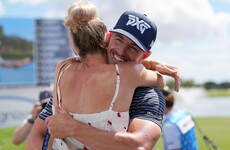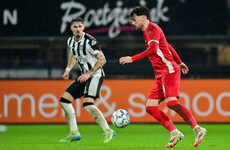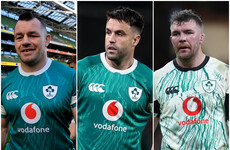NEXT FRIDAY AT the RDS, Anthony Horgan will tog out for a rugby match for the first time in three years.
The 40-year-old has played in the fixtures between Ireland Legends and England Legends a number of times in the past, but now he’s dusting down the boots once again in memory of a very special friend.
Anthony Foley will be honoured at this year’s Legends game, which kicks off at 6pm on Friday, and Horgan didn’t think twice about being involved in the tribute to his former Munster team-mate.
“Axel is the motivation for me,” says Horgan. “When I saw that it was being pushed on the Axel side of things, I was straight onto the guys saying I wanted to be involved. I might regret it afterwards!
“I swear to god, I played in one in Dublin about four years ago and I couldn’t walk for two days afterwards I was so battered.”
The physical toll will be worth it for Horgan, who manages Flannery’s pub in Cork these days – having spent the entirety of his professional playing career with Munster, helping them to their historic 2006 Heineken Cup success.
Horgan played alongside Foley with Munster from 1997 onwards and remembers the man as a brilliant team-mate and a dear friend.
“He was a huge leader but had a savage rugby brain,” says Horgan. “He was good at soccer, a superb golfer, good at most things he turned his hand to. You enjoyed his company, he’d make you laugh, he’d make you smile.
“You had 100% respect for the fella, so when he said something, you did it because you knew he’d do it too.
“He was a funny man to be around, I enjoyed his company. Off the field, he wasn’t afraid to have a few pints and I would have been in the same boat. We had good old craic and it’s been so hard to take. It’s a strange feeling when you think of him.
“But getting together on Friday is a good way to remember him.”
Horgan was a prolific part of Munster’s rise into European champions, with his record of 41 tries for the province only broken by Simon Zebo last year.
The ginger-haired wing came through the club ranks at Cork Con initially, before moving into a professional sport that was still learning the true meaning of professionalism in 1997.
“It was pretty much train twice a week and play on a Saturday back then, but you only had the inter-provincial games. You always got knocked out in the pool stages of Europe. The Celtic League came in and added to it, but it was semi-pro back when I started.”
Horgan rapidly established himself as a key part of the Munster team with his finishing ability and dogged work rate, playing alongside legendary figures like Mick Galwey and Peter Clohessy in the early years.
Horgan was just one in a crop of emerging talent, as the likes of Ronan O’Gara, Peter Stringer, John Kelly, David Wallace, Foley and John Hayes also began to impose themselves.
The development of the collective took time, of course, but Horgan remembers fondly how hard that Munster group pushed themselves in the those years.
“We were very lucky with the core group we had there,” says the Cork man. “We really played for each other. We were afraid of not performing, individually and collectively, in case we let each other down.
“We pushed ourselves. There were training sessions back in those days where we kicked the absolute living shit out of each other. There was nothing held back. If you were on the wrong side of the ruck, you expected Claw or Gaillimh to give you a good shoeing, and you wouldn’t do it again.
“We probably gave more abuse to ourselves than we did to the opposition sometimes. It was wanting to go that extra little bit for each other that really spurred us on.”
Munster began to grow up off the pitch too, and Horgan recalls the 2000 Heineken Cup semi-final win over Toulouse in at Stade Chaban Delmas in Bordeaux as a pivotal moment for all involved.
“It was a massive result for us, and if you remember the crowd that was there, players and supporters started to believe. It really kicked on from there.”
Of course, there were deep disappointments still to come for Munster, as they lost 9-8 to Northampton in the 2000 final and also suffered a 15-9 defeat to Leicester in the 2002 decider.
Indeed, Horgan and co. waited until 2006 to see captain Foley lift their holy grail after the famously thrilling win over Biarritz in Cardiff.
“The more you fail, the sweeter it is when you finally do win something,” says Horgan. “We had fallen twice at the last hurdle and there was such an amount of pressure on us from within and externally from supporters, that it was a huge monkey off our back.
“It made it that much sweeter being through what we went through.”
Horgan started the 2006 final on the right wing, but says the game itself remains something of a blur. What he does recall are the emotions beforehand, which Munster managed more maturely at the third time of asking.
“I was shitting myself! But that works both ways. You can use that nervousness and anticipation to your benefit, or let it get the better of you – which we probably did in 2000 and probably learned from it.
“We channeled it in the right way in 2006. In 2000, most people would say we played that game in a meeting before we took to the field, and the emotion of that got the better of us. You learn a lot from losing.”
The Munster team of the early 2000s are remembered as one that was built on their forward pack and controlling halfbacks, although they scored some remarkable tries.
Horgan – always chief among the try-scoring – doesn’t argue with the perception of Munster at that time, however, instead taking some pride in how they excelled.
“Look, I’ve no problem saying that we were known as a 10-man rugby team, to a certain extent.
“Trevor Halstead in 2006 gave that little bit where it slowly started pushing out a bit, Shaun Payne came along and we played a more expansive game, but we were never the flashiest team.
“We were never the flashiest team on paper either, but we played our hearts out. Referring back to 1999/2000, we were very much a homegrown team bar John Langford, Jimmy Williams, a few others. 90% of the team was Cork or Limerick and maybe that made a difference.”
Horgan has many scores to pick from, but ask him which one of his Munster tries is his personal favourite and he points instead to “the best team try” – that brilliant breakout from their own 22 against Toulouse in 2000.
Horgan never cared for the headlines himself, merely happy to be part of a Munster pride that played for each other.
He made his Ireland debut in 2003 and went to the World Cup that year, but his Test career wasn’t extensive. Despite the limited opportunities, Horgan has no regrets whatsoever.
“Not at all. I got seven caps for Ireland, I wouldn’t change a thing. I’m very lucky, I had 12 years as a pro rugby player. Everyone would have liked to play a bit more for their country, it was fantastic.
“I went to a World Cup in 2003, I didn’t tog out, was on the bench for the quarter-final but didn’t make it on. But it’s a fantastic experience and people would give their right finger to experience that. I count myself very lucky and I wouldn’t change a thing.”
Subscribe to The42 Rugby Show podcast here:















Nice article, Murray,
I don’t think any of us who believe crowley is #1 for now, would say crowley is the finished product. He’s got a long way to go yet in his career. And being a poor defensive set off lineout away for winning a grand slam on his first attempt is really promising even though he had ups and down during the tournament.
Wanna be careful saying things like crowley being ahead of sexton at this age.
@Patrick O’Sullivan: I don’t think Murray has to be careful about anything he says. It is rarely controversial, always balanced and very well researched.
@Paul Ennis: it has been said in the comments section of an article previously that crowley is ahead of where sexton was at this stage. Unsurprisingly, it drew negative replies.
@Patrick O’Sullivan: There will always be negative comments. Murray doesn’t need to worry about that & I don’t think he does. Murray’s opinion will carry more weight than some of us mere mortals expressing our tuppence worth.
Great article Murray (as always). I think there is a supreme inner belief and self confidence that Jack has that cannot be taught or learned. He has had it since day one. When I think about Ireland’s other 10s since ROG, maybe the only other with the same trait would have been Paddy Jackson. Johnny had to fight his demons and succeeded despite his early doubts and issues with self esteem. Sam might just have the same trait as Jack and explains why many of us have high expectations of him.
A good balanced and objective article. All three 10′s bring different attributes to the game ( i.e muti position play, better defensive tackles, kicking etc). Perhaps the era of a dominant 10 holding that position for a long number of years as seen in the past is now over…In any event great to have such an abundance of young talent.
@Dolores Scully: Definitely
@Dolores Scully: Exactly, well said! I really don’t buy this perceived anti-Crowley guff that is going around, “he’s not being backed.” He has to fight and earn his place like everyone else. All the other big sides don’t have a really set in stone option at 10. Look at the world champions! You can’t say who is first choice between Libbok, Pollard, Feinberg-Mgomezelu and most recently Hendrikse at the weekend. Ramos has been starting ahead of Ntamack. England have several options there. Why should Ireland be any different. Our 10 has to earn his place, just like every other position.
@Carmine Lorenzo: very good point. Fin will soon be putting pressure on Marcus in England. Mo’unga / Barret t / McKenzie in NZ. It seems to be Ireland where we make a big deal of the OH and the need to have 1 single option. You can see it on this site already, the need to find faults with the other player as an argument for your own favorite. The thing I hate the most is when the TV camera goes to the sub OH on the bench during the game to see what the reaction is to a good / bad bit of play from the guy on the pitch. That really gets on my nerves.
@Carmine Lorenzo: Agree 100% let Harry Byrne, I mean Ciarain Frawley, I mean Sam Pendergast fight and earn his place like Crowley did. Playing the full 160 minutes in a URC South African tour, and on turning 22 start and play the full 80 in France against the team that topped the French Pro 14 the previous year. Never getting near Irish camp until he forced his way into the reckoning. This article from Murray is better balanced than some of his previous attempts. Take for example his analysis of Pendergast Fiji performance. The overcooked penalty, refs fault, the pass to the wing, Casey’s fault, the kick out in the full Osbourne (shock a Leinster players fault), the yellow card etc. etc.
.
@Cormac McCarthy: how can someone with an unbalanced perspective recognise a balanced article? I think we’re just going to have to accept that it’s not very likely
@Michael Corkery: Great point. I agree 100%. They did it with Frawley last week. Pure shit.
@Michael Corkery: yeah I don’t get it why it seems that only Ireland have to have a lone option at 10. I don’t understand it personally. And you’re right the cameras planning to Frawley every 2 mins the other week was infuriating. Crowley is the current incumbent. I’d start him at the weekend, and barring a massive dip or injury, I’d probably be starting him in the first 6N game. However if Leinster continue going well and Frawley and Prendergast are playing well at 10, then surely they deserve to be in the reckoning too come the 6N. No player has a divine right to the 10 jersey now.
Regrettably the Munster/Leinster relationship is now so toxic that what used to be seen as entirely conventional – bringing on the 22 for the last 20 minutes of a game – has now become a huge sleight on the starter and which has to treated as an existential threat
@Kevin Ryan: it was always thus – but it just gets acerbated in the social media age. Ward v Campbell, Humphries v ROG, ROG v Sexton. Thé unlucky one is Frawley really, no one is even talking about him as a starter anymore
@Kevin Ryan: Hopefully it will all settle down when 6N comes around. Johnny was only ever taken off with 10 or 15 mins to go if the game was won or if he was injured. It is not the way we want the next 10 years to be. Hopefully these 2 boys can battle it out for the 10 jersey and the head coach can pick the 10 based on the opposition. For example, Jack offers a running threat that might be suited to playing v Scotland or England and Sam offers a kicking threat that will break down France (not saying that is the case, just as an example). Wouldn’t that be wonderful? If we know the replacement can be trusted, the starter can push himself to the limit for 55 / 60 mins and the finisher closes the game out with a bit of variation. What is not to like?
@Michael Corkery: couldn’t agree more – that sort of competition for the starting slot was good for both sets of players keeping them on their toes unfortunately there was a ‘twin’ for Sexton.
@Keno: wasn’t
@Kevin Ryan: Exactly! The same cohort who were crying and moaning about Sexton not being taken off in the WC vs NZ are now moaning that Crowley is being taken off with an hour gone. Is that not what they wanted in the World Cup? What’s the point in having a sub 10 if you’re not going to use it? Competition for places is good. We’re in a different era now, we’re going to get another Sexton who will make the position his own for 15 years.
@Michael Corkery: Frawley is a super replacement option and no problem to start at 10 or 15. His versatility is what keeps him in the 23, which I think he’d prefer than being outside of it. Lots of potential still. S Prendergast and Crowley most likely to back up each other at 10 when the other starts. Frawley for 12-15 realistically.
@Carmine Lorenzo: I agree. But I was/am of the opinion that Sexton should have been replaced in the WC v NZ. It was clear he was out on his feet for the last 10 – 15 mins ( understandably) and felt Crowley was well up for it. Perhaps AF feared a backlash if we lost ( which we did anyway) but at that stage, a drop goal was not gonna win us the match and the imho dubious decisions to kick to the corner earlier rather than take what seemed achievable penalty kicks ( unlike NZ) seemed to be a feature of our game. Anyway, hindsight is a great thing and as Leo says we’ll take the ” learnings”. Having such young quality 10′s should negate that happening in the future.
Interesting stats:
Sam Prendergast had 59 touches in 70 minutes v Fiji
Jack Crowley had just 12 vs New Zealand and 30 vs Argentina
Ireland have played off 9 with JGP, off 10 with Casey
Love to see Crowley get that service
@Adrian Breen: What were the possession stats? How many times did Ireland kick the ball downfield v NZ & Argentina compared to Fiji. Ireland dominated the ball versus Fiji and kicking was more dinks and chips than territorial. Your 9 & 10 will always touch the ball more against Fiji or even Italy than NZ, SA or France.
@Paul Ennis: yeah the Fiji game was much ‘wider’ if I can put it like that. We didn’t see as much of Izzy on the ball as I would have liked as a result
With the Osbourne injury, you would have to expect that Frawley will be picked to back up Crowley on Saturday. He covers outhalf, centre and full back. I think the biggest question about selection is not OH – Crowley will definitely be picked – but who will be left out in the centre.
@PatN: There’s no reason all three cannot be in the match 23. The best cover from 10-15 is Frawley, however, there’s no reason that either Crowley or S Prendergast cannot back each other up. If recent history is anything to go on there’s a higher likelihood that Frawley will be needed across the back three than at 10. So there’s still an option to have all three.
I’ve a feeling Murray knows who has been selected at 10 and is putting out a Crowley article to soften the blow for certain fans when he doesn’t start this weekend …
Hm